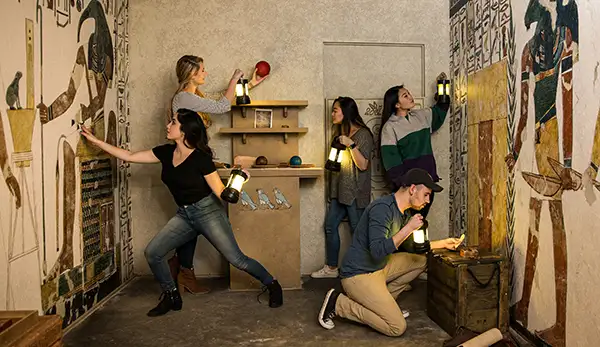Team Activities at Minneapolis Escape Room-- Perfect for Pals and Family members
Team Activities at Minneapolis Escape Room-- Perfect for Pals and Family members
Blog Article
Team Methods: Just How to Team up Successfully in a Getaway Area
Teams need to proactively listen to each participant's insights, appoint roles that straighten with private strengths, and keep normal check-ins to make certain emphasis and prevent redundancy. By fostering an atmosphere that values cohesion and flexibility, groups can considerably increase their effectiveness and success rates.
Establish Clear Interaction

To assist in clear communication, it is necessary to mark a main factor of contact for info dissemination. This function entails summing up searchings for and suggested approaches to ensure everybody continues to be on the same web page. Additionally, taking on a systematic method to discussions can avoid chaotic exchanges. As an example, brief, concentrated updates from each staff member can maintain the team informed without overwhelming them with information.

Appoint Functions Purposefully
While clear interaction sets the foundation for efficient teamwork, designating duties strategically guarantees that each team member's toughness are used effectively. In a getaway area scenario, the time-sensitive and intricate nature of difficulties demands a well-organized method to job delegation. By identifying and leveraging individual competencies, groups can maximize their analytical capacities and improve total efficiency.
A person with an eager eye for information might stand out in discovering hidden things, while a rational thinker might be much better matched to fixing problems. This function typically calls for solid organizational and interpersonal skills.
2nd, make certain that roles are adaptable and adaptable. As new difficulties emerge, the group needs to have the ability to pivot, reallocating tasks as required. This flexibility helps maintain momentum and prevents bottlenecks that could occur due to stiff duty tasks.
Ultimately, a tactical method to role project not just maximizes the toughness of each staff member however likewise cultivates a cohesive atmosphere, driving the team in the direction of an effective escape.
Use Diverse Abilities
Acknowledging and harnessing the varied skills within your group can considerably raise your efficiency in an escape area. Each employee brings distinct strengths to the table, and efficiently leveraging these abilities can quicken problem-solving and enhance general performance. For instance, an employee with strong logical abilities may succeed at understanding complex codes or patterns, while an additional with eager observational capacities might rapidly spot surprise hints that others might overlook.
Reliable interaction is essential to using these diverse skills. Encourage group participants to voice their understandings and concepts without delay, making certain that all potential remedies are taken into consideration. This inclusive approach fosters a dynamic setting where creativity and critical reasoning can flourish. In addition, appointing tasks that align with each member's strengths can avoid traffic jams and guarantee that progress is constant.
Moreover, variety in why not try these out abilities usually converts to variety in assuming designs, which is vital in a getaway area setting. While some challenges may need rational reasoning and precision, others could gain from creative and lateral thinking. By recognizing and leveraging this variety, groups can attend to a more comprehensive variety of difficulties a lot more efficiently, therefore raising their opportunities of an effective getaway.
Manage Time Successfully

First, designate first minutes for a quick study of the area. Recognize noticeable puzzles and separate jobs based on employee' toughness, ensuring that nobody is still. Set internal time checkpoints to review development occasionally; for circumstances, objective to have half the puzzles addressed by the mid-point of the game. This practice can aid maintain the team focused and avoid time from slipping away unnoticed.
In addition, prevent tunnel vision. If a problem is taking as well long, revolve group members or carry on to why not look here another difficulty, returning later with fresh perspectives. Communication is critical-- keep everybody upgraded on fixed puzzles and staying jobs to avoid repetitive initiatives.
Last but not least, make use of any type of hints or hints moderately but tactically - best escape room. Recognizing when to request aid can save beneficial time. By adhering to these time monitoring concepts, teams can significantly improve their chances of an effective and delightful retreat room experience
Debrief and Show
Representation is an essential facet of group development and improvement in the context of retreat rooms. When the difficulty is completed, whether successfully or otherwise, it is crucial for the group to engage in a structured debriefing session. This procedure allows group members to analyze their efficiency, identify strengths, and pinpoint areas for enhancement.
Start the debrief by reviewing what went well. Highlight particular circumstances of efficient communication, analytical, and partnership. Acknowledging these favorable habits strengthens them and encourages their repeating in future obstacles.
Review minutes of complication, miscommunication, or ineffective strategies. Motivate an open and constructive discussion where group participants can share their point of views without worry of criticism.
Final Thought
In verdict, successful collaboration in a retreat area is based upon clear interaction, tactical duty assignments, the reliable utilization of varied skills, and competent time her response management. By producing a natural and flexible group environment, the possibility of successfully fixing puzzles and accomplishing the purpose of running away the space is dramatically enhanced.
Report this page